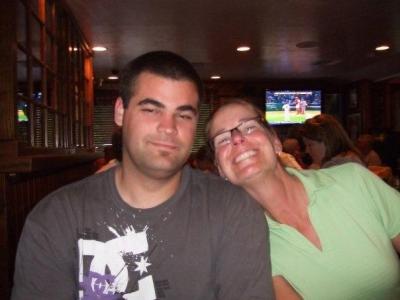A son’s death, a mother’s new purpose
By the time Brent Hastings graduated from Upper Cape Tech in 2006, he had landed a full-time job, accumulated a large circle of friends, was supported by a big extended family and appeared to be launched into a bright future.
Little more than a decade later, the young Wareham man was dead of an apparent heroin overdose — yet another local victim of a new wave of addiction that has swept the state and the nation.
As Hastings’ life spun out of control and into a downward spiral that began with legally prescribed painkillers and continued through treatment programs, court appearances and jail time; his mother, Melodye Conway, talked to few people about the situation.
Now, six months after receiving what she describes as "the call no parent should have to receive," Conway is silent no more. She is talking to friends, family, and the general public about the disease of addiction that took her oldest son’s life.
This Saturday, she has organized the Brent Hastings Memorial Golf Tournament at the Bay Pointe Club to raise awareness and to raise funds for the addiction-fighting Project Purple.
She said she is talking in the hope that Brent’s story can put a face on an epidemic that is tearing through the fabric of this and many communities.
(Note: Longtime Wareham resident Conway is also an advertising salesperson for Wareham Week.)
Born in Wareham, Brent Hastings attended Wareham Public Schools, played youth sports and hung out with a group of what Conway describes as “good kids.”
“Brent was a good kid — I got that feedback all the time," Conway remembers. "He graduated from high school with no trouble. He was just a good kid that you could call if you were in need, and he wouldn’t ask why.”
It was after a back injury on the job when he was about 20 that things turned bad. According to Conway, Hastings was prescribed Percocet and muscle relaxers by a doctor. He stopped taking the potent and addicting pain killers as the injury healed.
But after re-injuring himself and getting a similar prescription, kicking the Percocet habit was not so easy. Legally prescribed pills led to illegally purchased pills led to heroin.
Conway recalls about five years between first addiction and death, when her son was in and out of treatment programs, sometime "clean," sometimes back with his demons.
She recalls that Hastings stopped hanging out with the good kids and started spending most of his time with people who were using. He’d lose jobs. Eventually, he began to steal from Conway and others to support his addiction.
“They’ll steal from friends, family — and he did,” she said. “I sat in court more times than I want to count in the last four years.”
In 2013, Hastings was ordered to undergo drug testing as a condition of probation. After failing a series of tests, he went through two stays at Plymouth County House of Correction. He was released from the second shortly after Thanksgiving 2013.
Conway said she kept her son's problems a secret.
“As a parent, you wouldn’t want anyone to know," she explained. "You stop going to holidays because you don’t want to answer the question. You don’t want to hear the advice from people who had never been there.”
Brian Hurd, a friend of Hastings’ since the third grade, remembers that Hastings was usually the one to initiate their “hangouts.” But, as Hastings moved deeper into the drug world, he no longer reached out.
“All of the sudden, you just stopped hearing from him,” said Hurd. When he did make plans with his childhood friend, Hasting would always end up canceling. “Then we’d find out the crowd that he was hanging with wasn’t the best crowd.”
There were periods where Hastings would manage to kick the habit and get “clean,” but it was always difficult for Conway because she never knew which person was going to show up at her door.
“There are two different people — the addict and the child,” she said. “The hardest part is to have to help them out, but not give them the money to get deeper and deeper. It’s a tricky, tricky thing.”
On March 12, Conway received the dreaded call. Alone in his apartment, Hastings had injected heroin, overdosed and died.
Sadly, Hastings’ death was not a rare occurrence in Wareham. According to the state Department of Health, there were 28 opiate-related deaths in the town from 2000 to 2012. While anecdotal evidence is that the pace has accelerated, turmoil resulting from a rogue chemist and the resulting backlog of work at the state labratory make more recent statistics unavailable.
Thus far this year alone, there have been 30 reported heroin overdoses treated at Tobey Hospital compared to 35 for all of last year, according to hospital officials.
Wareham Emergency Medical Services Director Dave Evans said his crews have administered Narcan, an overdose reversal spray, 54 times since January 14, with most of those uses relating to heroin overdoses. “I think there’s a slight increase” in overdoses this year, said Evans. He said there were other instances where an addict either died or self-administered Narcan.
And it’s not just in Wareham.
Statewide, Gov. Deval Patrick declared a public health emergency in March after a three-month period that saw more than 180 opiate-related deaths. According to the state Department of Public Health, 668 people died in Massachusetts due to overdoses in 2012, a 10 percent increase from 2011.
Thanks to her time with her son and his troubles, Conway said she knows first hand that wealth and green lawns do not make a community immune from the scourge of addiction.
“It happens to anybody. The face of addiction is no longer the junkie on the corner with a needle in their arm,” said Conway. “It’s the guy working next to you. It’s everywhere.”
There is no easy solution — say Conway and experts on addiction.
Conway suggests the public should know more than it currently does about addiction. And she points a finger at pharmaceutical companies and doctors who continue to put more legal opiates into circulation.
“It’s sitting right in your medicine cabinet,” she said. “That’s truly the gateway drug.”
Those who deal in the sale of illegal drugs are “in the business of creating addicts,” Conway noted. She explained how a dealer who regularly sells illicit Percocet or Oxycontin to an addict will tell the addict that he is “fresh out of” the pills -- but offers a bag of cheap heroin to “get you through.”
“What someone may never have considered doing very quickly becomes the thing to do,” said Conway. Because heroin is cheaper than illegal pills, it’s the next logical step for an addict. “Once you make that leap, it’s a slippery slide.”
Project Purple is an organization started by Chris Herren, a former NBA star from Fall River who has battled addiction throughout his life. Herren and friends’ frequent school visits are aimed at preventing drug use from the beginning. They also help support recovering addicts and substance abusers and their families.
Nick Correia is a New Bedford native who got clean from drugs and alcohol with the help of Project Purple. Correia said he got on heroin the same way Hastings did — he injured his knee, and once his prescription ran out, he bought painkillers on the street. When the painkillers became too difficult to afford, he was offered heroin.
“I had the buzz from when I had that prescription,” he said, noting that he could get a week’s worth of heroin for less than what it would cost for a day’s worth of painkillers.
Correia said the Herrens — Chris and his brother Mike, who’s also involved in the group — helped save his life.
Conway said that when Hastings passed away, she was able to donate $5,000 to Project Purple in his name and that proceeds from the golf tournament would also go to Project Purple.
“$5,000 doesn’t seem like a lot, but it can pay for someone to live in a sober house. It can help guide people through the process of finding recovery program,” said Conway.
Golf and dinner reservations are closed, but the public is invited to the evening portion of the event from 8 to 11 p.m.
For more information, contact brenthastingsmemorial@gmail.com or call Conway at 508-951-2300.












